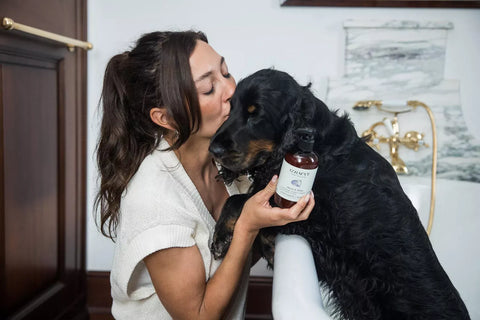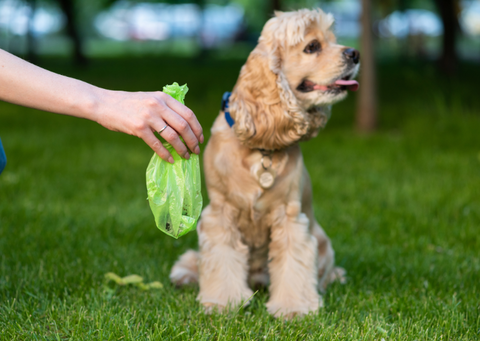What is your dog's skin microbiome
Your dog's skin microbiome or skin flora is its main line of defence against external pathogens. Think of it as an army-one with 'healthy' micro-organisms as soldiers, ranging from viruses to fungi to bacteria. By the way, and this goes for both humans and dogs, these organisms are essential for good health and are abundant on the skin, in the intestines and in the vagina.
Many factors influence the composition of the skin microbiome:
-
lifestyle
-
diet
-
gender
-
age
-
environment
-
medication, antibiotics, shampoo and other skin or fur products
If your dog's skin microbiome is disturbed, its skin's defence system is weakened. The risk of skin allergies, eczema and inflammations increases, causing your dog to suffer from a permanent itch (1-4).
This is how you keep your dog's skin (microbiome) healthy
Wash your dog as little as possible
If you do wash him or her, use a microbiome-friendly shampoo-one especially designed for dogs. With most shampoos, your dog's skin will need seven (!) days to recover. Although antiseptic and antibacterial shampoos may be necessary in some cases, they do kill all the good soldiers in the microbiome. So only use such shampoos in consultation with your vet.
Only use antibiotics when you really have to
Antibiotics not only kill the bad bacteria, but also the good ones. So avoid them when you can.
Give your dog the right food
Poor nutrition is the cause of many skin problems. Call your vet and find out what kind of food your dog will benefit from. Supplement your dog with essential nutrients to feed the skin from the inside out. Immune & Tune is packed with these essential nutrients: vitamin B, omega-3 fatty acids (DHA & EPA) and Zinc.
References
-
Rodrigues Hoffmann A. Het cutane ecosysteem: de rol van het huidmicrobioom in gezondheid en zijn associatie met inflammatoire huidaandoeningen bij mens en dier. Vet Dermatol. 2017;28(1):60-e15. doi:10.1111/vde.12408
-
Hakanen E, Lehtimäki J, Salmela E, et al. Urban environment predisposes dogs and their owners to allergic symptoms. Sci Rep. 2018;8(1):1-9. doi:10.1038/s41598-018-19953-3
-
Santoro D, Rodrigues Hoffmann A. Canine and Human Atopic Dermatitis: Twee gezichten van dezelfde gastheer-microbe interactie. J Invest Dermatol. 2016;136(6):1087-1089. doi:10.1016/j.jid.2016.03.015
-
Chermprapai S, Ederveen THA, Broere F, et al. The bacterial and fungal microbiome of the skin of healthy dogs and dogs with atopic dermatitis and the impact of topical antimicrobial therapy, an exploratory study. Vet Microbiol. 2019;229(September 2018):90-99. doi:10.1016/j.vetmic.2018.12.022




Kommentarer (0)
Det finns inga kommentarer till artikeln. Var först med att kommentera!